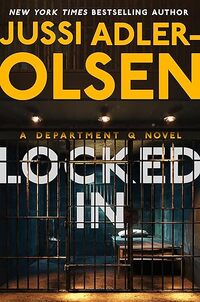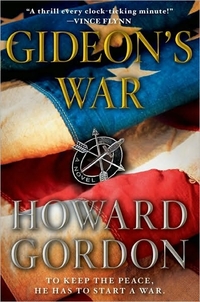 LOCKED IN |
 Sunshine, secrets, and swoon-worthy stories—June's featured reads are your perfect summer escape. |

Purchase
Touchstone Thriller Excerpt of Gideon's War by Howard GordonCHAPTER ONE UNTIL HE TRIED PUTTING on his tuxedo, Gideon Davis didn't realize how much weight he'd gained. The extra pounds were hardly noticeable on his muscular six-foot-one frame, but Gideon had felt the tug across his shoulders when he buttoned his jacket earlier that afternoon. Now, it felt even tighter, and he tried to keep himself from squirming in his chair as the president of the United States addressed the General Assembly of the United Nations. ". . . ten thousand lives have been lost in the bloody civil war between the Guaviare militia and the armed forces of the Colombian government, most of them innocent civilians. For years, both sides repeately rejected calls for a cease-fire, until the prospect of a peaceful resolution to the conflict seemed unattainable to everyone in the international community. Everyone . . . except for one man." President Alton Diggs nodded toward Gideon, who smiled a smile that felt as tight as his tuxedo. Being in the spotlight was something he still hadn't grown accustomed to. Seventeen hours earlier, Gideon had been sitting in a jungle hut in Colombia, while armed men prowled around, waiting for an excuse to start shooting one another. The cease-fire he'd negotiated was the culmination of a three-month-long series of marathon sessions during which he'd spent day and night shuttling between government and rebel forces, usually eating the same meal twice—once with each faction—which accounted for the extra ten pounds he'd put on. In order to keep the warring sides at the table, he'd partaken of huge heaping portions of ajiaco, the traditional stew made of chicken, corn, potatoes, avocado, and guascas, a local herb, and chunchullo, fried cow intestines. As effective a diplomatic strategy as it was, Gideon knew that no amount of food would make the cease-fire hold. Chances were slim that it would last through the month. But the president had told him the best way to maintain the cease-fire was to get the international community invested, and the best way to get them invested was through a major media event. And the media loved Gideon Davis. President Diggs continued reciting for the audience some highlights of Gideon's career as a Special Presidential Envoy. He credited Gideon with defusing crises from the Balkans to Waziristan, and for being among the first public figures with the courage to argue that the United States needed to rethink its approach to the war on terror. To his detractors, Gideon was dangerous—a pie-in-the-sky slave to political correctness who thought the enemies of Western civilization could be jawboned into holding hands and singing "Kumbaya." But anyone who'd ever spent any time with Gideon knew how far from the truth that was. They knew he was a straight talker with zero tolerance for bullshit. They knew he listened to people. Simple enough virtues, but ones rarely found in Washington—which was why some insiders had tagged Gideon as the fastest rising star in American politics. Before Gideon had left for Colombia, President Diggs had let slip that some party bigwigs were considering him for one of several upcoming races. One rumor even had Gideon on the president's short list of potential running mates. This caught Gideon by surprise, since he'd never had any real political ambitions. Exposing his private life to that kind of scrutiny, and having to make the inevitable compromises that come with holding public office, had no interest for him. But the prospect of wielding enough power to make a real difference in world affairs had caused Gideon to rethink his position. It was one of the reasons he'd agreed to squeeze into his tuxedo to accept this award from the president, who was now winding up his introduction. ". . . more than simply building bridges, this man has dedicated himself to that ancient and most sacred cornerstone of our moral code: Thou Shalt Not Kill. And so, it is my great privilege to present the United Nations Medal of Peace to one of the great peacemakers of our time, Gideon Davis." Gideon approached the podium to a generous stream of applause. He shook the president's hand, then bowed his head to allow him to place the ribboned medallion around his neck. "Thank you, Mr. President," Gideon said, before acknowledging several other heads of state whom protocol deemed worthy of acknowledgment. "This is a great honor, and I accept it with gratitude and humility. All of us in this room know that peace is more than just the absence of war . . . it's also the absence of poverty and injustice. The real work still lies ahead of us, and its ultimate success depends on the diplomatic and economic support of every country represented in this room tonight." As Gideon continued to talk about the necessity of international solidarity, he saw a woman in a red dress stifle a yawn. He was losing them. But that didn't stop him from making the point he wanted to make—that the real heroes were the men and women in Colombia who had found the courage to compromise and to break the cycle of violence that had claimed the lives of so many of their countrymen. "With your support, their goodwill and hard work might actually make this a just and lasting peace. They're the ones we should be honoring tonight. And so I share this award with them." He took off the medal, held it in the air over his head. But his gesture was met with silence. I blew it, Gideon thought to himself. These people hadn't come here to be reminded of their moral and economic obligations. They'd come to feel good. They'd come expecting Gideon to shovel out the kind of self-congratulatory rhetoric that keeps the United Nations in business. Gideon scolded himself for ever thinking otherwise and wished he'd found an excuse to stay home and get some sleep. But then the applause started. Sudden and decisive, like a thunderclap followed by a great rain that just kept going until it flooded the room with the collective approval of every person in the audience. Even the woman in the red dress was clapping. And for a moment, Gideon allowed himself to feel a flicker of hope that the cease-fire he'd worked so hard to make happen just might last. At least for a little while. A few minutes later, Gideon was ushered into a large adjoining room. As successful as his speech had been, he had no illusions that it would have any real impact on the cease-fire. Making speeches was the easy part. Turning the enthusiasm of politicians and diplomats into real action was a much taller order. Most of the people here couldn't be counted on to follow through on any of the wine-inspired promises they'd made. Some of them were powerless; others were simply full of shit. An embassy official from the Netherlands introduced himself to Gideon, who remembered that the man had been his country's foreign minister before being sidelined to an embassy post because of an ongoing relationship with a call girl. "You are a visionary," the embassy official said, his small hand clamping around Gideon's bicep. Gideon did his best to smile. "I appreciate the compliment, but I just did what the president sent me to do." "Your modesty is attractive, of course," the man said, "but you do yourself an injustice when—" "Mr. Davis? I'm sorry to interrupt . . ." Gideon turned toward the speaker. Unlike the people around him— all of them wearing tuxedos or evening gowns—the man who was addressing him wore a crisp military uniform. Dress blues with a white web belt. His hair was trimmed high and tight, with the sidewalls rarely seen outside the United States Marine Corps. "The president would like to see you." "Excuse me," Gideon said to the embassy official, grateful for an excuse to end their conversation before it had a chance to start. The embassy official glared at the marine, clearly unaccustomed to being interrupted by some lowly soldier, as he parted the crowd for Gideon. The marine led Gideon to a door. Posted on either side was a pair of Secret Service agents. One of them opened the door for Gideon, who entered a large conference room, where President Diggs was talking quietly to a plain but pleasant-faced man in his sixties with the jowly, careworn expression of a hound dog. It was Earl Parker, Gideon's friend and mentor, and as close to a father as anyone in his life. "Uncle Earl . . ." "You were good in there," Parker said. "Truly inspiring." "I didn't know you were here." "I was standing in back," Parker said, smiling. "I'm proud of you, son." Gideon returned Parker's smile, surprised at how eager he still was for the older man's approval. He had known Earl Parker most of his life. Parker was not actually his uncle, but he had been a friend of his father's, and after Gideon's parents died twenty years ago, Earl Parker had stepped in, becoming almost a father figure to him—and to his older brother, Tillman. After their parents' deaths they had gone to live with a foster family. But Parker had come to visit them every weekend or two, playing football in the yard with them, checking on their progress in school, and generally acting as though they were related by blood. They had wondered enough about his constant attention to eventually ask him why he spent so much time with them. He explained simply that he had served in the Marines with their father and owed him a debt so great that caring for his sons would not even begin to repay it. Beyond the fact that he'd never married, the boys knew precious little about Uncle Earl's personal life. Which didn't stop Gideon from trying to assemble some rough biography based on his observation of certain details. Like Parker's teeth. They weren't good, indicating an upbringing in the sort of family where dentistry was considered a great extravagance. When he spoke, his accent had the marble-swallowing quality found only in the highest, most desperate hills of east Tennessee. But the public record had also yielded some choice facts, which is how Gideon first learned that beneath that modest exterior was an extraordinary man. Parker had been the first and only Rhodes scholar to come from East Tennessee State University. After his stint at Oxford, he enlisted in the army and served for eight years in the Marine Corps, before going on to hold a string of increasingly powerful jobs in various departments and agencies of the United States government whose functions were rarely clear to the average American. His current job was deputy national security advisor, and his was generally considered to be one of the most important voices on foreign policy in the White House. Some said even more important than that of the secretary of state. It was Uncle Earl who'd brought Gideon into the State Department, convincing him to leave his position at the United Nations. But after the Twin Towers fell, the apprentice found himself challenging his mentor. Gideon started supporting the position that the United States needed to engage more fully with the Islamic world, using the tools of soft power, like diplomacy and economic aid, while Parker argued that overwhelming military force was the only thing our enemies understood. Gideon and Parker had always engaged in good-natured debates over their political differences. There had been a time when the vigor of those debates had been part of the bond that connected them. But in recent years, their policy differences had begun to strain their personal relationship— especially as Gideon's influence with the president grew. Both men were pained by the widening rift between them, but neither knew quite what to do about it. Gideon looked from Uncle Earl back to the president, who was now speaking. "How familiar are you with the Sultanate of Mohan?" "Just what I've read in the State Department briefs." Gideon proceeded to tell them everything he knew about the small island nation—that it was equidistant between Malaysia and the Philippines, with a population of somewhere between five and six million people, 90 percent of them Malay-speaking Muslims, 5 percent ethnic Chinese and Indians, and a smattering of off-the-census tribes living in the uplands. Gideon also knew that Mohan was more or less the personal possession of the Sultan, who had ruthlessly put down an Islamist insurgency a few years earlier. With some back-channel military assistance from the United States, the Sultan's armed forces had managed to contain the jihadis to a few remote provinces. The president nodded tightly. "Except it turns out the jihadis were down but not out. Once they realized how much oil was buried beneath those coastal waters, they started recruiting and rearming. And while you were in Colombia, they came out of hiding. They're moving against several of the inland provinces, and our friend the Sultan is in some serious trouble." None of this had even been on Gideon's radar when he headed down to South America. "I need you and Earl to get over there." "When?" "Right away." Gideon ran his hands across his tuxedo. "In this monkey suit? I don't even have a toothbrush." The president's eyes glittered with amusement. "I hear they have toothbrushes in Mohan." "With respect, sir, I just got back a few hours ago. I haven't even been briefed on Mohan, I don't know the conflict points or the key players on either side—" Uncle Earl interrupted, "This isn't about negotiating a truce." "Then what's it about?" "Your brother," he said. Although Uncle Earl's face rarely betrayed emotion of any kind, it was as troubled as Gideon had ever seen him. "Tillman needs our help." "Our help with what?" Parker wrestled with the question before he finally answered. "We've got forty-eight hours to save his life." He glanced down at his watch. "I take that back. Make it forty-seven." Excerpt from Gideon's War by Howard Gordon |
|
| |||
|
||||




 © 2003-2025
© 2003-2025